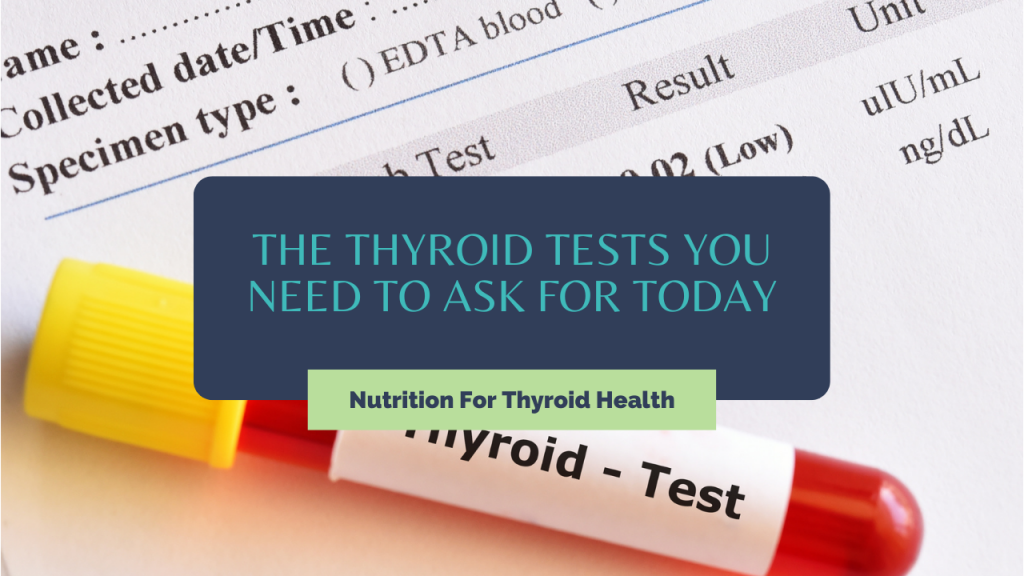The Thyroid Tests You Need to Ask for Today
Oftentimes when people come to me with symptoms of a sluggish thyroid, they’ve been experiencing thyroid issues for many years — for some, even a couple of decades. They may have visited their primary care physician or an endocrinologist, had some thyroid tests done, and walked away with a diagnosis of “normal” even though they feel anything but.
That’s precisely why I want to discuss the importance of proper thyroid testing. In my experience, people aren’t getting their thyroid disorder properly diagnosed — because different practitioners aren’t actually testing all the parameters that they can test when it comes to thyroid health.
Below, I’ll walk you through the different thyroid tests that are available to you. Hopefully, if you are struggling with some of these issues, you’ll be able to find someone who will conduct more extensive tests, help you interpret the information, and then make recommendations about getting the help you need.
TSH Test
The thyroid-stimulating hormone, or TSH, test is the main one that most practitioners will order. The idea is to establish a baseline and find out how well the pituitary gland in your brain is talking to your thyroid gland — this is what triggers your body’s ability to produce thyroid hormones.
If you are underactive, your TSH level will be high, and if you are overactive, TSH will be low. However, the problem with TSH testing is that there’s such a wide span of numbers within the “normal” range.
In reality, the “optimal” or “functional” range of those numbers is actually quite smaller than the standard TSH ranges that most laboratories use to identify a condition.
T4 and T3 Tests
The next hormone that should be checked when it comes to thyroid testing is the T4, which is considered more of the inactive type of thyroid hormone. T4 has to be converted via the liver and thyroid gland into an active form, known as T3 — which also needs to be tested but often is not.
If you’re lucky, you’ll get the TSH test and sometimes the free T4 test, but not T3. I like to make sure that at a minimum, people are getting a TSH, a free T4, and a free T3 test. This at least tells us if people’s thyroid hormone is being converted into the active free T3 form.
Having that free T3 number is valuable, because oftentimes I’ll see people falling within the larger range of “normal” TSH and even T4 levels, and meanwhile their T3 is on the floor. On paper, it might appear that you have enough T4 to convert, so they just assume that conversion is happening and don’t test for T3.
When Things Aren’t “Normal”
If your numbers fall within the “normal” range but you still have classic thyroid symptoms like fatigue, menstrual problems, depression, anxiety, weight gain, or other issues, this is where it’s important to pay attention to the nuances with regard to those numbers.
When your T4 isn’t converting well into T3, it gets stored as reverse T3, which is basically inactive T3. Poor conversion could be happening because:
- You’re having conversion problems in general.
- You have nutrient deficiencies.
- You have a lot of stress in your life that only makes matters worse for your hormones.
So what happens if you have higher levels of reverse T3? It’s not getting into your tissues or your cells, and it’s basically not helping you at all.
Antibody Testing
If you have the presence of thyroid antibodies in your system, this signifies that your body is producing cells — antibodies — that are attacking your very own thyroid gland.
Remember, the thyroid gland is essentially the captain of your body. Because there are thyroid hormone receptors in every cell and tissue of your body, the thyroid gland affects everything.
As such, if your body is producing antibodies that are attacking your thyroid, you’re going to have symptoms and feel horrible. This is an inflammatory condition and something that can be mitigated with medication and/or lifestyle and dietary changes.
Focus on What You Can Control
While some practitioners swear by medication alone, the truth is, you can optimize your thyroid health by what you put into your body. This includes the food you eat, your stress management practices, and your lifestyle choices. Here are some things you can do today to help your thyroid:
- Incorporate mindfulness practices like meditation
- Eat high-quality, whole foods
- Eliminate processed foods and added sugars
If you feel like you’re struggling with thyroid issues, I want to encourage you to seek out the complete gamut of thyroid testing that’s available to you. I’m here for extra support and guidance if you ever need it.
Be sure to sign up for a free guide to fight fatigue with five easy ways to conquer your sleep and banish fatigue for good by clicking on this link.
The Thyroid Tests You Need to Ask for Today Read More »




